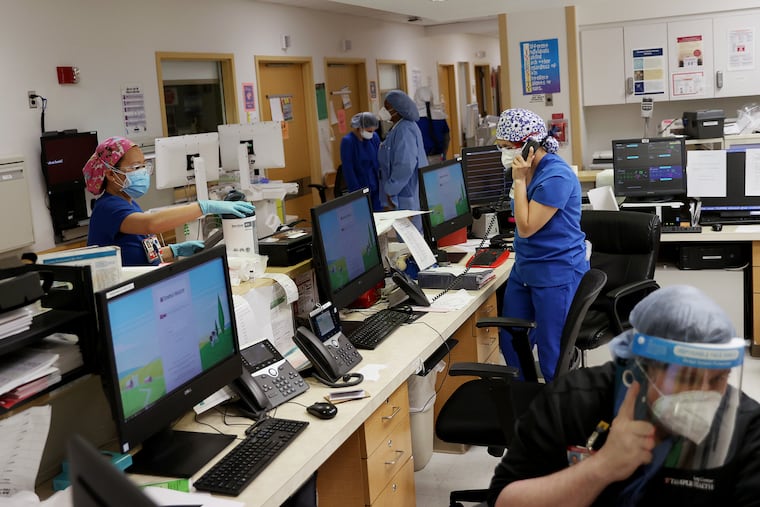Nurses are reaching their COVID-19 breaking point. It didn’t have to be this way. | Expert Opinion
Nurses must use their collective experiences and memories through the COVID-19 pandemic to build better systems of care.

Today, we will continue to lose more American citizens to COVID-19. Yes, hospitals will be full and healthcare workers will be stretched beyond their cognitive, emotional, and physical limits. It is difficult to look at the numbers anymore; they are sobering: more than 2,500 Americans dead in one day from an invisible and pernicious virus. And it is difficult to see nurse colleagues suffering for one more minute of the day.
Nurses tell us every day that they need help and are getting sick themselves. They are working while exhausted, begging for mask mandates to protect the public who eventually become their patients—and they are accepting the unacceptable. Why did it have to be this way?
The pandemic has opened gaping sores within the healthcare system that have failed to be addressed: safe staffing requirements; personal protective resources; consistency in payment models, including hazard pay and equity; ethics preparedness; respect for the sacrifices of those on the front lines; and the collective grief shared by patients, families, and clinicians.
» READ MORE: Who will die today? A nurse’s typical day in the COVID ICU. | Expert Opinion
Why do nurses accept this? I have asked myself this question many times. Why do they accept wearing recycled N-95 masks multiple times that cause skin irritations and possible infections? Why do they accept occupational inequity in pay when they are loyal employees and choose to remain in the fight at their home institutions? Why do they accept poor staffing when data has told us for years that nurses make a difference in the lives of patients? Why do they accept being told that they cannot be tested for COVID-19 while sports figures can get all the testing they need?
When the pandemic is under control, many nurses will want to forget the hazards and inequities that they experienced. And, as a nurse myself, I know that there are many times when we neglect making the efforts required to better our own nursing communities, because fulfilling our professional and ethical oath to care for patients and their families is our highest priority. Also, we look away from the hazards and inequities because we have long assumed that leaders will do what is right, make sound decisions, and protect us. But nurses are afraid and have been afraid since the start of the pandemic. A survey in March-April by the American Nurses Association on COVID-19 concerns reported that more than 50% are worried about having supplies to care safely for patients on their shift, 39% are very concerned or afraid to come to work, and 41% are extremely concerned about accessing reliable and credible information. The surge in cases across the country has only intensified these concerns.
» READ MORE: Plummeting morale, decreasing staff, and shrinking resources leave Pa. nurses in desperate need | Expert Opinion
Nurses cannot do this anymore. The more nurses look away, the more they accept. They must stand for what is right and just and take ownership of the value of their vital work.
Nurses must use their collective experiences and memories through the COVID-19 pandemic to build better systems of care, recognizing their contributions to the public good. Many frontline workers have spoken out about being called heroes when they are expected to be martyrs. People enter some professions knowing that their jobs may claim their lives. Nurses never expect to lose their lives, but to save others’ lives. Throughout the pandemic at the front lines of care, nurses’ improvisation with masks, staffing, and resources has saved lives.
Nurses will always be essential personnel, hopefully bringing their skills and expertise to the bedside and beyond. In her work on the valuation of nursing, Marcella Rutherford speaks of innovative value drivers that mesh caring with the economic and technical aspects of nursing. It will be up to the profession to reframe its position within the economics of the healthcare system following COVID-19. To start, nurses must demand that their local hospital is staffed adequately with the appropriate number of registered nurses (RNs) per patient. Nurses also need to educate the public on what an RN is and why they are essential to any just society.
Indeed, the vaccine is coming and promises a way out of this heartbreaking year, but Americans cannot forget what we went through, and nurses and physicians will be forever changed by what they were asked to do, which for many went beyond reasonable expectations and ended in their deaths. When this pandemic is behind us, we must never forget that nurses and other healthcare workers died doing their jobs—and we must never forget that our expectation that they accept such an outcome is wrong.
Connie M. Ulrich, PhD, RN, is a Professor and the Lillian S. Brunner Chair in Medical and Surgical Nursing at the University of Pennsylvania School of Nursing. culrich@nursing.upenn.edu